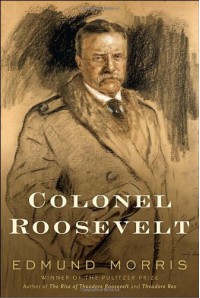The culmination of TR's life

The publication in 1979 of Edmund Morris’s The Rise fo Theodore Roosevelt heralded the start of a monumental multi-volume study of our nation’s 26th president. Though sidetracked for a number of years by his assignment as Ronald Reagan’s official biographer, Morris finally released his second volume, Theodore Rex, in 2001, which chronicled Roosevelt’s life during his years in the White House. This book, which recount’s Roosevelt’s post-presidential years, provides a long-awaited completion to Morris’s project. It bears all of the strengths and weaknesses of Morris’s approach to his project, now on display in a chronicle of an eventful decade in an already active life.
Morris begins with his subject (whose insistence on being referred to post-presidency as “Colonel Roosevelt” provides the inspiration for the book’s title) on safari in Africa, the first leg of a year-long voyage abroad. Designed to give his handpicked successor, William Howard Taft, an opportunity to flourish outside of his long shadow, Roosevelt’s trip continued with a triumphal tour of Europe, one that the author recounts in meticulous detail. Returning to universal acclaim, he also confronted a divisive political scene, with the dominant Republican Party torn by increasingly acrimonious infighting between its progressive and conservative wings. After an initial silence, Roosevelt joined the fray, campaigning for a number of progressive Republicans in the 1910 midterm elections. Morris sees the defeat of these candidates as the first blow to his public standing, weakening him at a time when he faced growing calls from Progressives to challenge Taft for the 1912 Republican presidential nomination.
Increasingly disillusioned with his former colleague, Roosevelt entered the race in February 1912. Morris’s description of his primary battle against Taft is one of the high points of this book, capturing all of the drama of a former president taking on his party’s leadership. Though Roosevelt was the clear choice of the voters, the limited use of presidential primaries at the time and Taft’s control of party patronage ensured Roosevelt’s defeat at the national convention that June. Undaunted, Roosevelt bolted from the GOP and campaigned for the White House under the banner of the newly-founded Progressive Party. Morris eschews any analysis of the campaign in favor of a narrative that describes his travels across America, which ended with a dramatic assassination attempt by “a weedy little man” who claimed to have been urged to do so by the ghost of William McKinley. Despite the surge of sympathy the attempt generated, Roosevelt fell short in his effort, losing in November.
Financially weakened, Roosevelt turned to his pen and took to the road once more. After a journey to Arizona with his sons Archie and Quentin, Roosevelt embarked on what he viewed as his last great adventure – an expedition into the jungles of the Amazon. His journey proved difficult and physically demanding, with personality conflicts, a leg injury, and a recurrence of malaria taking its toll on the former president. Roosevelt’s return coincided with the outbreak of war in Europe, leaving him chafing with inactivity as Woodrow Wilson first kept America out of war, then left the former president on the sidelines as he led the nation into it. By its end, Roosevelt nursed both the pain of losing his youngest son and an increasing range of physical ailments, a cumulative effect of decades of strenuous activity that left him dead at the age of 60 in 1919.
Morris recounts Roosevelt’s life in vivid, occasionally even florid prose. He is a master of presenting the rich drama of Roosevelt’s adventures, an easy enough task given the material he had to work with but well done nevertheless. Yet like his earlier volumes, this descriptive account comes with little in the way of context or analysis. There is little here to explain Roosevelt’s broader impact on progressivism, his contributions of his journeys to natural history, or the importance of his participation in the preparedness movement. While this diminishes the utility of Morris’s work as a study of Roosevelt’s contribution to American history, it does not detract from the overall enjoyability of Morris’s entertaining, masterful account. Combined with his earlier volumes, it is likely to serve as the standard by which Roosevelt biographies are judged for decades to come.
 1
1






